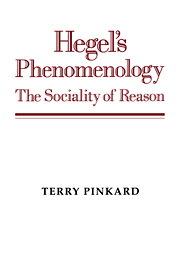Book contents
- Frontmatter
- Contents
- Acknowledgments
- Hegel's Phenomenology
- 1 Why the Phenomenology of Spirit?
- 2 The claims to self-sufficient knowledge: sense-certainty, perception, understanding
- 3 The claims of self-sufficient agency: freedom and self-consciousness
- 4 Modern life's project of self-justification
- 5 Modern life's alternatives and modern life's possibilities
- 6 The self-reflection of the human community
- 7 The essential structure of modern life
- Notes
- Works cited
- Index
5 - Modern life's alternatives and modern life's possibilities
Published online by Cambridge University Press: 05 September 2014
- Frontmatter
- Contents
- Acknowledgments
- Hegel's Phenomenology
- 1 Why the Phenomenology of Spirit?
- 2 The claims to self-sufficient knowledge: sense-certainty, perception, understanding
- 3 The claims of self-sufficient agency: freedom and self-consciousness
- 4 Modern life's project of self-justification
- 5 Modern life's alternatives and modern life's possibilities
- 6 The self-reflection of the human community
- 7 The essential structure of modern life
- Notes
- Works cited
- Index
Summary
From Greek character to modern autonomy
To introduce the section on “Spirit,” the Phenomenology develops a story about how a group of agents has moved from a conception of impersonal reason as providing them with a fixed standard by which they evaluate all their various contingent claims to a conception of rationality as a form of reflective social practice — that is, as “spirit.” Attempts at reassurance through accounts that appeal to impersonal reason or to the idea of a fixed, rational “self” have undermined themselves such that only some type of account that understands reason as a form of social practice would seem to be able to succeed. In seeking an affirmation from modern science and social practice, modern agents have found that the accounts that they must give of their practices of reason-giving and criticism have led them to the view that what they have come to count as authoritative for themselves has to do with an understanding of “the way things are done.” The apparent success of the modern world in throwing off the constraints of tradition in science and in practice (and particularly the failure of those attempts by people like Shaftesbury to revive certain ancient traditions of virtue by relying on more modern doctrines of the observation of nature) helped to reassure the moderns that their conceptions were indeed correct.
- Type
- Chapter
- Information
- Hegel's PhenomenologyThe Sociality of Reason, pp. 135 - 220Publisher: Cambridge University PressPrint publication year: 1994



